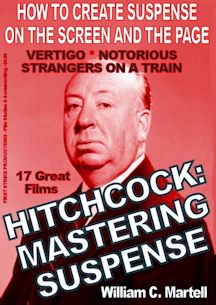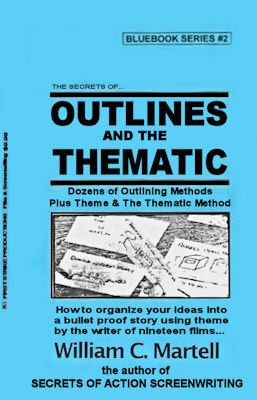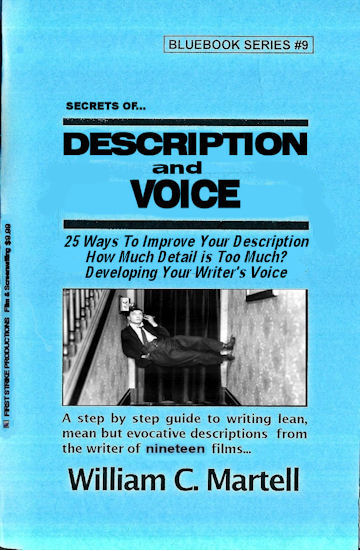Got Christmas Cash or Holiday money burning a hole in your pocket? Get an Amazon Gift Card from that Aunt who usually give you the ugly sweater? How about buying some ebooks? Start the year with some information and education to help you get more writing done? Or maybe you forgot someone on your gift list? Amazon even has a "gift button" that sends the book in a "wrapper" that must be clicked to find out what the gift book is! So if you are looking for a late stocking stuffer for people with electronic feet - check out these books! Hey, they don't even need a Kindle - Amazon has a free app for any device (it doesn't work on your Mr. Coffee - I tried). Blue Books are $1 off now... but they won't be forever!
- Bill
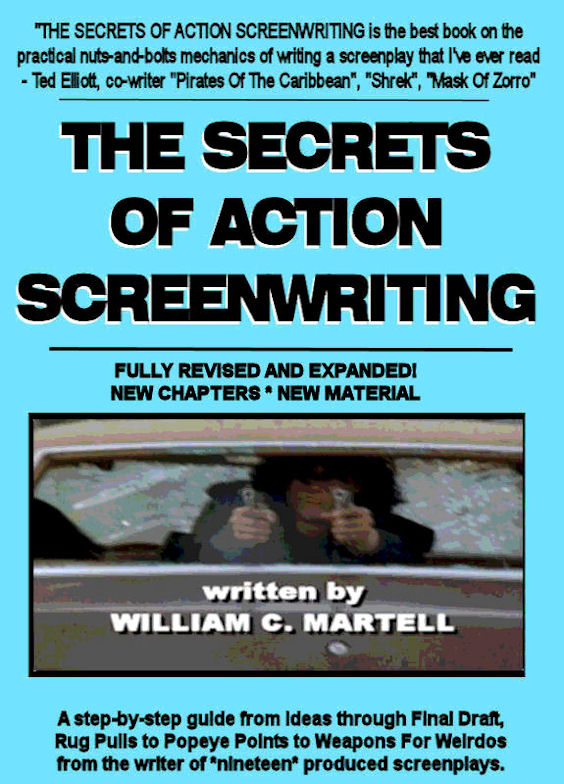
THE BOOK THAT STARTED IT ALL!
*** THE SECRETS OF ACTION SCREENWRITING *** - For Kindle!
*** THE SECRETS OF ACTION SCREENWRITING *** - For Nook!
Why pay $510 for a used version of the 240 page 2000 version that used to retail for $21.95? (check it out!) when you can get the NEW EXPANDED VERSION - over 500 pages - for just $9.99? New chapters, New examples, New techniques!
"SECRETS OF ACTION SCREENWRITING is the best book on the practical nuts-and-bolts mechanics of writing a screenplay I've ever read." - Ted Elliott, co-writer of MASK OF ZORRO, SHREK, PIRATES OF THE CARIBBEAN and the sequels (with Terry Rossio). (ie; 4 of the top 20 Box Office Hits Of ALL TIME.)
HITCHCOCK: EXPERIMENTS IN TERROR

HITCHCOCK DID IT FIRST!
We all know that Alfred Hitchcock was the Master Of Suspense, but did you know he was the most *experimental* filmmaker in history?
** HITCHCOCK: EXPERIMENTS IN TERROR **
Contained Thrillers like “Buried”? Serial Protagonists like “Place Beyond The Pines”? Multiple Connecting Stories like “Pulp Fiction”? Same Story Multiple Times like “Run, Lola, Run”? This book focuses on 18 of Hitchcock’s 53 films with wild cinema and story experiments which paved the way for modern films. Almost one hundred different experiments that you may think are recent cinema or story inventions... but some date back to Hitchcock’s *silent* films! We’ll examine these experiments and how they work. Great for film makers, screenwriters, film fans, producers and directors.
Films Examined: “Rear Window”, “Psycho”, “Family Plot”, “Topaz”, “Rope”, “The Wrong Man”, “Easy Virtue”, “Lifeboat”, “Bon Voyage”, “Aventure Malgache”, “Elstree Calling”, “Dial M for Murder”, “Stage Fright”, “Champagne”, “Spellbound”, “I Confess”, and “The Trouble with Harry”, with glances at “Vertigo” and several others. Over 77,000 words, under $5!
HITCHCOCK: MASTERING SUSPENSE
LEARN SUSPENSE FROM THE MASTER!Alfred Hitchcock, who directed 52 movies, was known as the “Master Of Suspense”; but what exactly is suspense and how can *we* master it? How does suspense work? How can *we* create “Hitchcockian” suspense scenes in our screenplays, novels, stories and films?
This book uses seventeen of Hitchcock’s films to show the difference between suspense and surprise, how to use “focus objects” to create suspense, the 20 iconic suspense scenes and situations, how plot twists work, using secrets for suspense, how to use Dread (the cousin of suspense) in horror stories, and dozens of other amazing storytelling lessons. From classics like “Strangers On A Train” and “The Birds” and “Vertigo” and “To Catch A Thief” to older films from the British period like “The 39 Steps” and “The Man Who Knew Too Much” to his hits from the silent era like “The Lodger” (about Jack The Ripper), we’ll look at all of the techniques to create suspense!
Films Included: NOTORIOUS, SABOTAGE, STRANGERS ON A TRAIN, THE 39 STEPS, REBECCA, TO CATCH A THIEF, FRENZY, FOREIGN CORRESPONDENT, THE LODGER, THE BIRDS, TORN CURTAIN, SABOTEUR, VERTIGO, THE MAN WHO KNEW TOO MUCH (1934), THE MAN WHO KNEW TOO MUCH (1955), SUSPICION, and NUMBER SEVENTEEN. 17 Great Films!
Only 125,000 words!
Price: $5.99
STORY IN ACTION SERIES

Brand New!
All five "Bourne" movies (including "Legacy" and it's potential sequels) - what are the techniques used to keep the characters and scenes exciting and involving? Reinventing the thriller genre... or following the "formula"? Five films - each with an interesting experiment! A detailed analysis of each of the films, the way these thrillers work... as well as a complete list of box office and critical statistics for each film. This book is great for writers, directors, and just fans of the series.
Only $3.99 - and no postage!
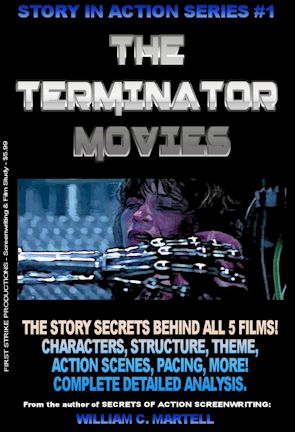
Over 240 pages!
*** THE TERMINATOR SERIES *** - For Kindle!
He's back! The release of "Terminator: Genisys" was set to begin a new trilogy in the Terminator story... 31 years after the first film was released. Now James Cameron, Schwarzanegger, and Linda Hamilton are returning for a new film! What draws us to these films about a cybernetic organism from the future sent back in time? Why is there a new proposed trilogy every few years? This book looks at all five Terminator movies from a story standpoint - what makes them work (or not)? What are the techniques used to keep the characters and scenes exciting and involving? How about those secret story details you may not have noticed? Containing a detailed analysis of each of the five films so far, this book delves into the way these stories work... as well as a complete list of box office and critical statistics for each film. This book is great for writers, directors, and just fans of the series.
Only $3.99 - and no postage!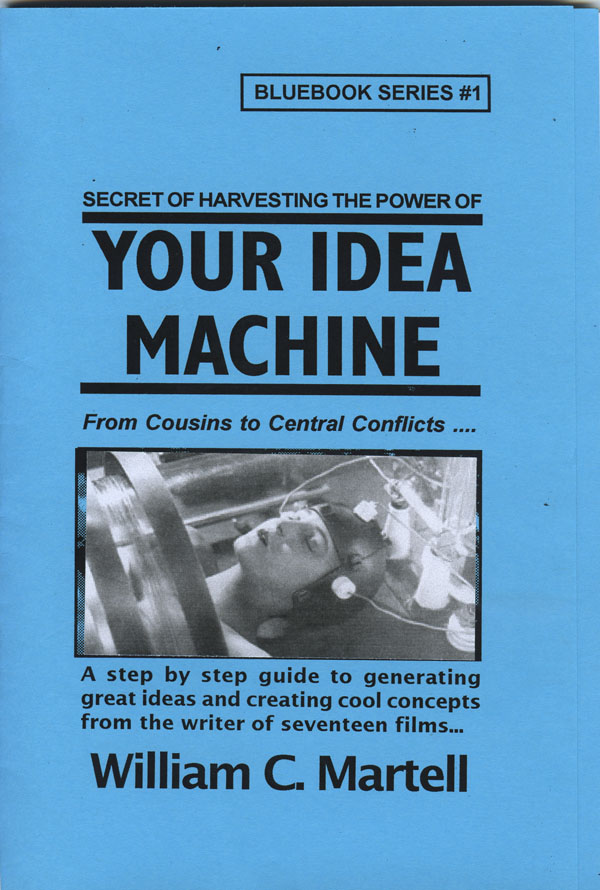
#1 GOT IDEAS?
*** YOUR IDEA MACHINE *** - For Kindle!
*** YOUR IDEA MACHINE *** - For Nook!
Expanded version with more ways to find great ideas! Your screenplay is going to begin with an idea. There are good ideas and bad ideas and commercial ideas and personal ideas. But where do you find ideas in the first place? This handbook explores different methods for finding or generating ideas, and combining those ideas into concepts that sell. The Idea Bank, Fifteen Places To Find Ideas, Good Ideas And Bad Ideas, Ideas From Locations And Elements, Keeping Track Of Your Ideas, Idea Theft - What Can You Do? Weird Ways To Connect Ideas, Combing Ideas To Create Concepts, High Concepts - What Are They? Creating The Killer Concept, Substitution - Lion Tamers & Hitmen, Creating Blockbuster Concepts, Magnification And The Matrix, Conflict Within Concept, Concepts With Visual Conflict, Avoiding Episodic Concepts, much more! Print version is 48 pages, Kindle version is over 175 pages!
BRAND NEW!
#2 OUTLINES & THE THEMATIC!
OUTLINES & THE THEMATIC Blue Book.
ARE YOUR SCENES IN THE RIGHT ORDER?
AND ARE THEY THE RIGHT SCENES?
Your story is like a road trip... but where are you going? What's the best route to get there? What are the best sights to see along the way? Just as you plan a vacation instead of just jump in the car and start driving, it's a good idea to plan your story. An artist does sketches before breaking out the oils, so why shouldn't a writer do the same? This Blue Book looks at various outlining methods used by professional screenwriters like Wesley Strick, Paul Schrader, John August, and others... as well as a guest chapter on novel outlines. Plus a whole section on the Thematic Method of generating scenes and characters and other elements that will be part of your outline. The three stages of writing are: Pre-writing, Writing, and Rewriting... this book looks at that first stage and how to use it to improve your screenplays and novels.
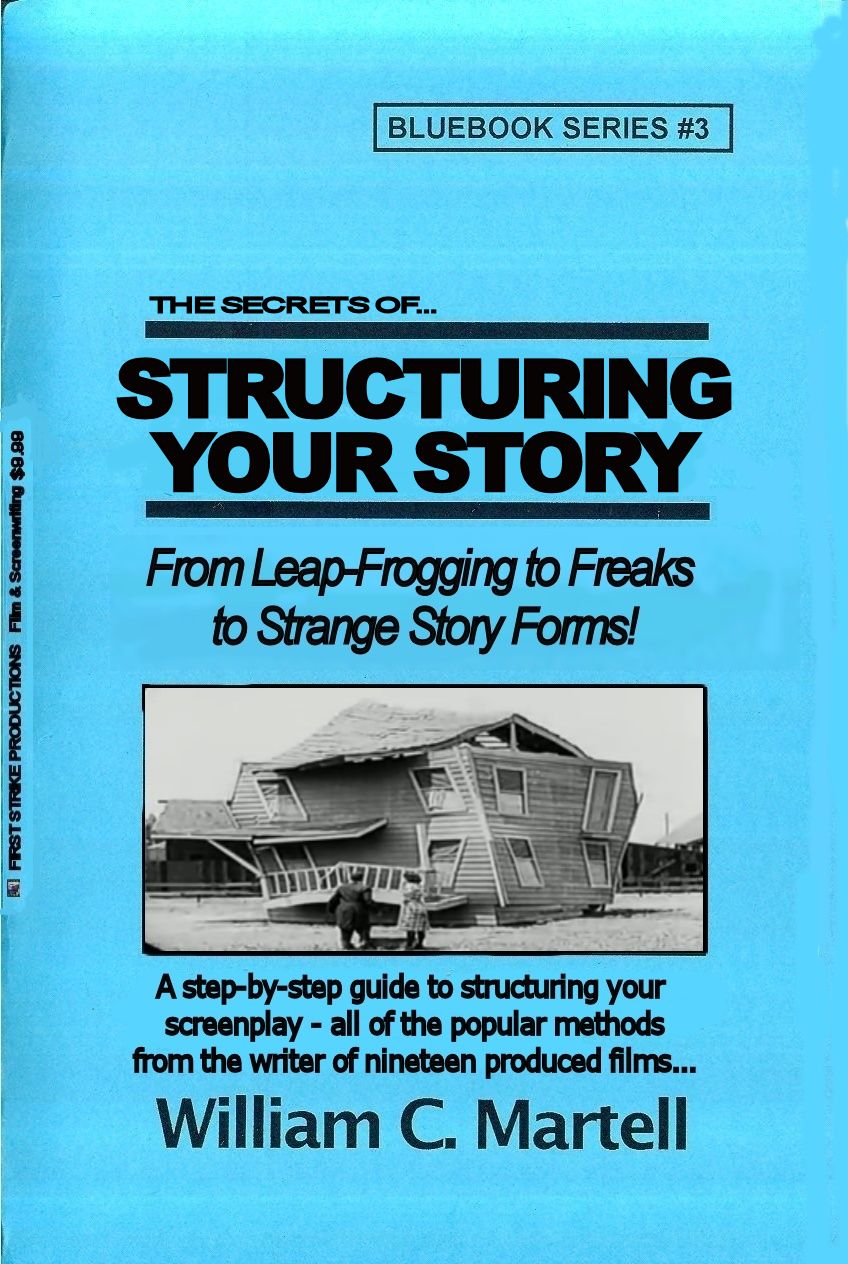
#3 STRUCTURING YOUR STORY
*** STRUCTURING YOUR STORY *** - For Kindle!
William Goldman says the most important single element of any screenplay is structure. It’s the skeleton under the flesh and blood of your story. Without it, you have a spineless, formless, mess... a slug! How do you make sure your structure is strong enough to support your story? How do you prevent your story from becoming a slug? This Blue Book explores different types of popular structures from the basic three act structure to more obscure methods like leap-frogging. We also look at structure as a verb as well as a noun, and techniques for structuring your story for maximum emotional impact. Most of the other books just look at *structure* and ignore the art of *structuring* your story. Techniques to make your story a page turner... instead of a slug!

#4 HOW YOU TELL IT
*** STORY: WELL TOLD *** - For Kindle!
This book takes you step-by-step through the construction of a story... and how to tell a story well, why Story always starts with character... but ISN'T character, Breaking Your Story, Irony, Planting Information, Evolving Story, Leaving No Dramatic Stone Unturned, The Three Greek Unities, The Importance Of Stakes, The Thematic Method, and how to create personal stories with blockbuster potential. Ready to tell a story? Print version was 48 pages, Kindle version is over 85,000 words - 251 pages!

#6 START STRONG!
*** HOOK 'EM IN TEN *** - For Kindle!
Your story doesn't get a second chance to make a great first impression, and this book shows you a bunch of techniques on how to do that. From the 12 Basic Ways To Begin Your Story, to the 3 Stars Of Your First Scene (at least one must be present) to World Building, Title Crawls, Backstory, Starting Late, Teasers and Pre Title Sequences, Establishing Theme & Motifs (using GODFATHER PART 2), Five Critical Elements, Setting Up The Rest Of The Story (with GODFATHER), and much more! With hundreds of examples ranging from Oscar winners to classic films like CASABLANCA to some of my produced films (because I know exactly why I wrote the scripts that way). Biggest Blue Book yet! Print version was 48 pages, Kindle version is over 100,000 words - 312 pages!
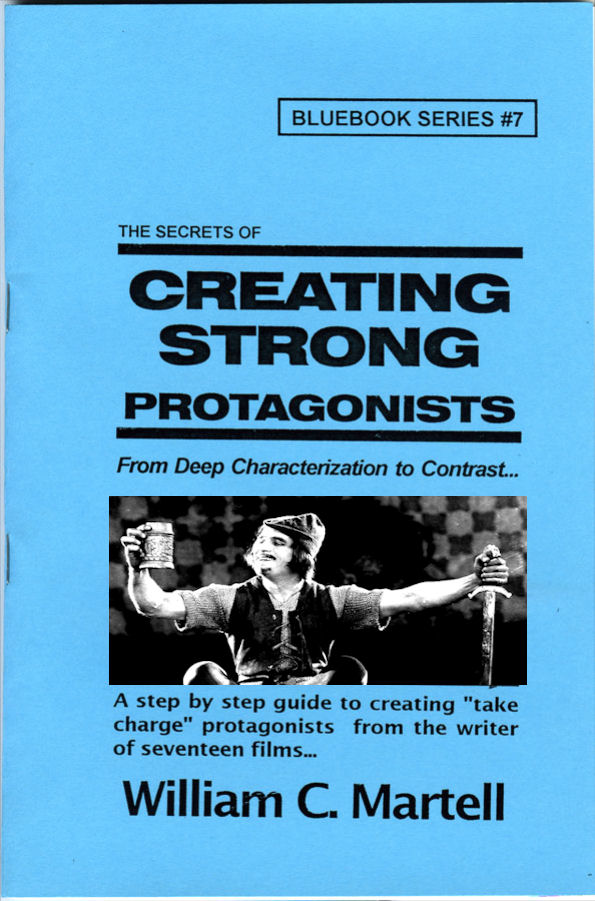
#7 THAT STAR PART!
*** CREATING STRONG PROTAGONISTS *** - For Kindle!
*** CREATING STRONG PROTAGONISTS *** - For Nook!
Expanded version with more ways to create interesting protagonists! A step-by-step guide to creating "take charge" protagonists. Screenplays are about characters in conflict... characters in emotional turmoil... Strong three dimensional protagonists who can find solutions to their problems in 110 pages. But how do you create characters like this? How do you turn words into flesh and blood? Character issues, Knowing Who Is The Boss, Tapping into YOUR fears, The Naked Character, Pulp Friction, Man With A Plan, Character Arcs, Avoiding Cliche People, Deep Characterization, Problem Protagonists, 12 Ways To Create Likable Protagonists (even if they are criminals), Active vs. Reactive, The Third Dimension In Character, Relationships, Ensemble Scripts, and much, much more. Print version is 48 pages, Kindle version is once again around 208 pages!
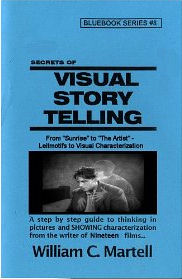
#8 DO YOU WRITE PICTURES?
*** VISUAL STORYTELLING *** - For Kindle! (exclusive)
Show Don't Tell - but *how* do you do that? Here are techniques to tell stories visually! Using Oscar Winning Films and Oscar Nominated Films as our primary examples: from the first Best Picture Winner "Sunrise" (1927) to the Oscar Nominated "The Artist" (which takes place in 1927) with stops along the way Pixar's "Up" and Best Original Screenplay Winner "Breaking Away" (a small indie style drama - told visually) as well as "Witness" and other Oscar Winners as examples... plus RISE OF THE PLANET OF THE APES. Print version is 48 pages, Kindle version is over 200 pages!
#9 DESCRIPTION & VOICE Blue Book!
DESCRIPTION & VOICE Blue Book.
IS HALF OF YOUR STORY IN TROUBLE?
Most screenplays are about a 50/50 split between dialogue and description - which means your description is just as important as your dialogue. It just gets less press because the audience never sees it, the same reason why screenwriters get less press than movie stars. But your story will never get to the audience until readers and development executives read your script... so it is a very important factor. Until the movie is made the screenplay is the movie and must be just as exciting as the movie. So how do you make your screenplay exciting to read? Description is important in a novel as well, and the “audience” does read it... how do we write riveting description?

#10 THEY SOUND DIFFERENT!
*** DIALOGUE SECRETS *** - For Kindle!
*** DIALOGUE SECRETS *** - For Nook!
Expanded version with more ways to create great dialogue! How to remove bad dialogue (and what *is* bad dialogue), First Hand Dialogue, Awful Exposition, Realism, 50 Professional Dialogue Techniques you can use *today*, Subtext, Subtitles, Humor, Sizzling Banter, *Anti-Dialogue*, Speeches, and more. Tools you can use to make your dialogue sizzle! Special sections that use dialogue examples from movies as diverse as "Bringing Up Baby", "Psycho", "Double Indemnity", "Notorious", the Oscar nominated "You Can Count On Me", "His Girl Friday", and many more! Print version is 48 pages, Kindle version is over 175 pages!

#11 WHAT IS A SCENE?
*** SCENE SECRETS *** - For Kindle!
***
What is a scene and how many you will need? The difference between scenes and sluglines. Put your scenes on trial for their lives! Using "Jaws" we'll look at beats within a scene. Scene DNA. Creating set pieces and high concept scenes. A famous director talks about creating memorable scenes. 12 ways to create new scenes. Creating unexpected scenes. Use dramatic tension to supercharge your scenes. Plants and payoffs in scenes. Plus transitions and buttons and the all important "flow"... and more! Over 65,000 words! Print version was 48 pages, Kindle version is around 210 pages!
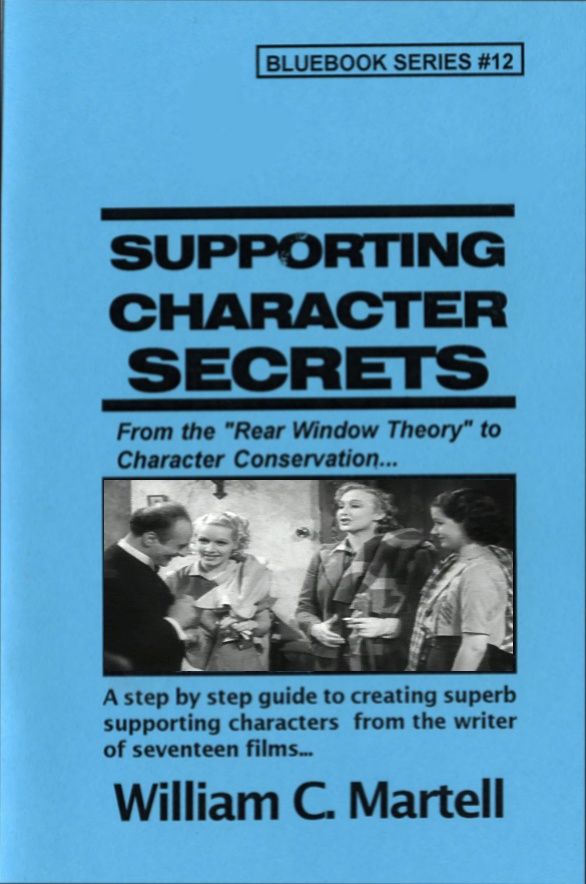
#12 GREAT SUPPORTING CHARACTERS!
*** SUPPORTING CHARACTERS & SUBPLOTS *** - For Kindle! (Exclusive)
Expanded version with more techniques to flesh out your Supporting Characters and make them individuals. Using the hit movie BRIDESMAIDS as well as other comedies like THE HANGOVER and TED and HIGH FIDELITY and 40 YEAR OLD VIRGIN and many other examples we look at ways to make your Supporting Characters come alive on the page. Print version was 48 pages, Kindle version is around 170 pages!
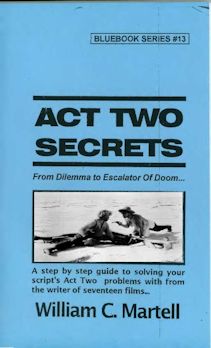
#13 STUCK IN THE MIDDLE?
*** ACT TWO SECRETS *** - For Kindle!
Expanded version with more techniques to help you through the desert of Act Two! Subjects Include: What Is Act Two? Inside Moves, The 2 Ps: Purpose & Pacing, The 4Ds: Dilemma, Denial, Drama and Decision, Momentum, the Two Act Twos, Subplot Prisms, Deadlines, Drive, Levels Of Conflict, Escalation, When Act Two Begins and When Act Two Ends, Scene Order, Bite Sized Pieces, Common Act Two Issues, Plot Devices For Act Two, and dozens of others. Over 67,000 words (that's well over 200 pages) of tools and techniques to get you through the desert of Act Two alive! Print version was 48 pages, Kindle version is over 208 pages!
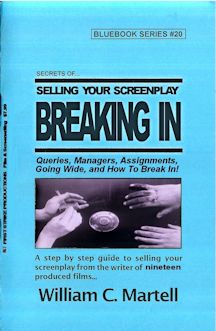
#20 HOW TO SELL!
*** BREAKING IN BLUE BOOK *** - For Kindle!
Should really be called the BUSINESS BLUE BOOK because it covers almost everything you will need to know for your screenwriting career: from thinking like a producer and learning to speak their language, to query letters and finding a manager or agent, to making connections (at home and in Hollywood) and networking, to the different kinds of meetings you are will have at Studios, to the difference between a producer and a studio, to landing an assignment at that meeting and what is required of you when you are working under contract, to contracts and options and lawyers and... when to run from a deal! Information you can use *now* to move your career forward! It's all here in the Biggest Blue Book yet!
Print version was 48 pages, Kindle version is over 400 pages!- Bill
